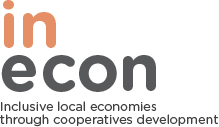Partners of the project:
Utopia o.z./SK
Alternativa Zdola o.s./CZ
Szatyor Egyesület/HU
Instytut Spraw Publicznych/POL
Financial support:
Inclusive local economies through cooperatives development
 Cooperatives and social enterprises (SE) are tools of employees' and citizens' participation, that can encourage economic activities in the territories and economic sectors which are not within the scope of interest of strong economic actors. The project consists of research, exchanging practical know-how and creating infrastructure facilitating this type of economic activities. The research will be aimed at mapping the legislative framework and public policy in the field of cooperativism and social enterprises in all V4 countries. The output of the research will provide an overview of a situation in this sector, proposal of possible changes in public policies for public authorities and model centers (incubators) for complex support of cooperatives and SE. Another part of the project focuses on collecting and mutual exchange of practical experiences and best practices in the field of cooperativism and social enterprise. The research and exchange of know-how will result in establishing incubators to provide help with setting up cooperatives and SE and mediation of economic relations with partners from all V4 countries. The incubators will on one hand provide services to all interested citizens or existing cooperatives and on other hand to local authorities supporting cooperative economy and coping with social exclusion. A long-term aim is to create a resilient network empowering local cooperative social economy.
Cooperatives and social enterprises (SE) are tools of employees' and citizens' participation, that can encourage economic activities in the territories and economic sectors which are not within the scope of interest of strong economic actors. The project consists of research, exchanging practical know-how and creating infrastructure facilitating this type of economic activities. The research will be aimed at mapping the legislative framework and public policy in the field of cooperativism and social enterprises in all V4 countries. The output of the research will provide an overview of a situation in this sector, proposal of possible changes in public policies for public authorities and model centers (incubators) for complex support of cooperatives and SE. Another part of the project focuses on collecting and mutual exchange of practical experiences and best practices in the field of cooperativism and social enterprise. The research and exchange of know-how will result in establishing incubators to provide help with setting up cooperatives and SE and mediation of economic relations with partners from all V4 countries. The incubators will on one hand provide services to all interested citizens or existing cooperatives and on other hand to local authorities supporting cooperative economy and coping with social exclusion. A long-term aim is to create a resilient network empowering local cooperative social economy.
During the course of the project a conference will be organized. The aim of the conference is to promote ideas of cooperativism and social enterprise, present research results, exchange practical experiences and good practices and create closer relations between different actors working on promoting and implementing cooperative economy from all V4 countries.
Project partners:
Utopia (Slovakia, http://utopia.sk)
Utopia is a civic association whose main goal is to support deepening of democratic processes in society, building citizen's participation and increasing social inclusion. Utopia is part of the OpenData movement promoting open and transparent public administration. It started to implement participatory budgeting in various Slovak cities and fosters the cooperative and community-driven action as tools of local economic and social development.
Alternativa Zdola (Czech Republic, http://alternativazdola.cz)
Alternativa Zdola strives to transfer systemic alternatives from across to Globe to the Czech conditions. These alternatives help local economies to thrive and they bring about zero unemployment rates, foster true participation of people in decision-making, introduction of modern technologies and environmental sustainability. As the organization supports participation of citizens in political and economic life of the country, it focuses on many themes and issues which – although necessary for functioning democratic society, still largely remain outside of the mainstream politics such as social housing, decentralization of the energy sector, development of local economies, cooperativism, alternative financial system or employees participation.
Szatyor Association (Hungary, http://szatyorbolt.hu/)
Szatyor Association is aimed to promote environement and social conscious alternatives and lifestyle. The Association itself runs a local socail enterprenourship called Szatyorbolt that has its business part operating on eco-conscious values and offering shopping alternatives for those who care about environment, their health and the community. It supports action leading to minimalization of environmental impacts of food production and distribution while also supporting small scale farming. Szatyor Association that organizes workshops and trainings about conscious consumption and lifestyle. It also organizes visits to farmers to enhance better understanding of how food in the countryside is produced.
Fundacja Instytut Spraw Publicznych (Poland, http://www.isp.org.pl)
ISP is a leading Polish think tank and an independent centre for policy research and analysis, established in 1995. Its mission is to contribute to informed public debate on key Polish, European and global policy issues. Its main areas of study include European policy, social policy, civil society, migration and development policy as well as law and democratic institutions.
 The project is funded by the International Visegrad Fund (http://visegradfund.org/)
The project is funded by the International Visegrad Fund (http://visegradfund.org/)
Photo: flickr
![čeština [Beta] čeština [Beta]](http://utopia.sk/inecon-theme/images/spacer.png)

